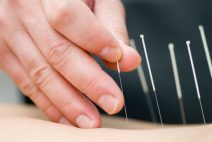The following post is written by our Traditional Chinese Medicine Provider, Christopher Cole.
From time to time people ask me to explain what Traditional Chinese Medicine (TCM) is all about. First some context. For years I taught TCM and supervised a student clinic in Toronto. I taught diagnosis, acupuncture, herbology, and the philosophy that grounds this medical practice. So to do  justice to the medicine with my answer always feels like a challenge. A worthy challenge. The Chinese have been developing this medicine for several thousand years. Let that sink in…. Western medicine has been around for at most 300 years. TCM has benefitted from a history of practice that has not been interrupted for thousands of years.
justice to the medicine with my answer always feels like a challenge. A worthy challenge. The Chinese have been developing this medicine for several thousand years. Let that sink in…. Western medicine has been around for at most 300 years. TCM has benefitted from a history of practice that has not been interrupted for thousands of years.
TCM is about you. Not your symptoms. (At least not directly.)
TCM is about addressing the root of what causes your symptoms.
To help address the root cause, we consider everything that could contribute to your illness and your well being. This includes your:
- Lifestyle
- History
- Family situation
- Work
- Pastimes
- Diet
- Exercise
- Sleep patterns
- Willingness to change
One’s willingness or unwillingness to change is often at the root of illness. So if you really don’t want to change, don’t see a TCM practitioner. If you need help to change, by all means, see a TCM practitioner.
The medicine reflects the place and time when it is practiced. 20 years ago TCM, primarily acupuncture, was known in North America mostly for treating pain. The insurance industry in the USA did a survey of TCM practitioners about 10 years ago and discovered something shocking. Pain is no longer the number one reason people seek out the help of TCM practitioners. It is now stress and anxiety. More people in the USA see acupuncturists for stress than they do for pain.
In a practical sense the medicine is made up of the methods of treatment. These include talking and getting to know you, demonstrating genuine care for you, and the more commonly recognized methods:
- Acupuncture
- Herbal formulas (eaten or applied to the skin)
- Massage
- Acupressure
- Cupping
- Gua sha
- Moxibustion heat therapy
- Qigong energy therapy
In Ontario, the practice of TCM is legally regulated by a college (the CTCMPAO), and TCM practitioners are permitted to make medical diagnoses (a legally restricted activity, same for your GP) which guide their treatments. They are permitted to proscribe herbal formulas. You can go to the college web site and check to see if a practitioner is registered and has a provincial # that every 3rd party insurance provider requires. I’m # 2476.
Is it like real medicine? (I am no longer insulted by this question. People don’t know what they don’t know. Same for me.) TCM practitioners treat every known medical condition. And they get good results. In North America the only type of medicine we don’t practice is emergency medicine. You go to emerge for that. TCM practitioners in China have been doing and publishing clinical research for decades. Just check pubmed or medscape. Translation from Chinese into English has been slow so there is a huge backlog of articles waiting to reach western practitioners. Our oldest medical texts / books are thousands of years old.
What are your patients typically like?
I don’t have a typical patient. I do focus on three specific medical concerns: 1) fertility, 2) stress and anxiety, and 3) pain. My general observations of the people who come to see me… they are mostly women and I wish more men would be proactive about their health concerns (many men take better care of their cars and tools), often my patients are frustrated with or have exhausted their options with western medicine, they want alternatives to drugs, or they want to avoid surgery. I see some really difficult cases.
There are two phrases that patients say to me that give me the most satisfaction: 1) I’m pregnant and 2) I’m in remission.
These brief items give you snapshots of a healing practice that is old and well developed. If you want to know if it can help you, come and have a short chat with me. I believe 20 minutes is a good investment of our time. No charge.
Christopher Cole
